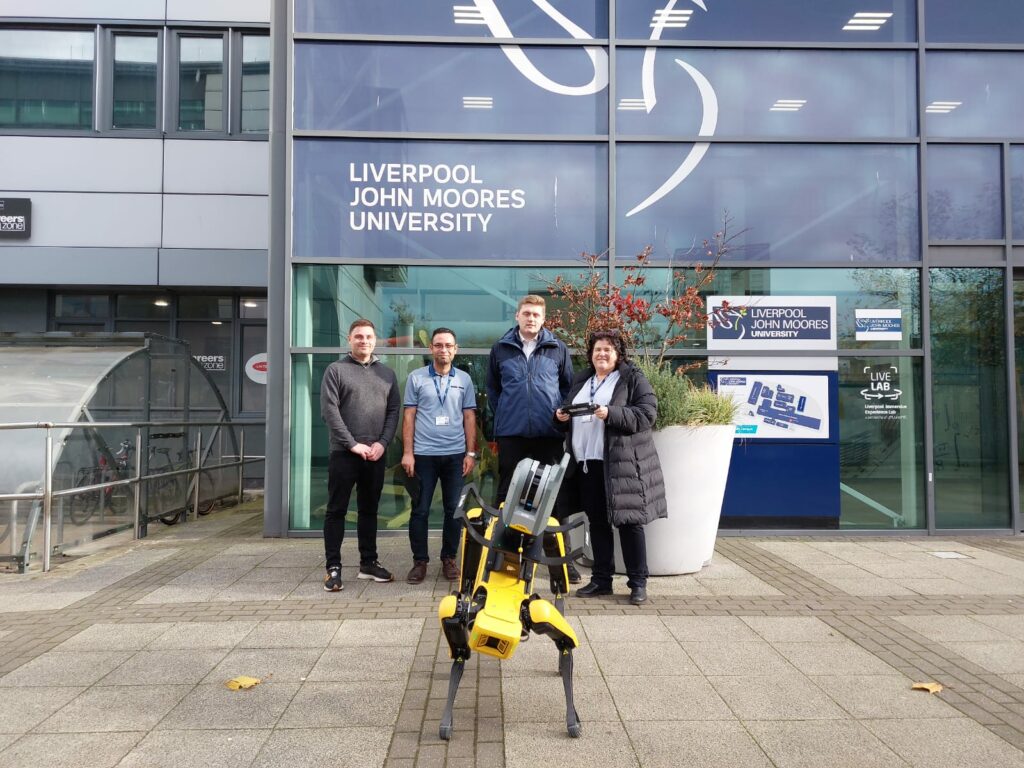
BuildingPoint UK and Ireland collaborates closely with universities within our distribution area. Through our extensive network, we have successfully introduced cutting-edge digital technologies that are poised to captivate the next wave of tech-savvy, motivated engineers and surveyors, precisely the talent our industry craves. Addressing the existing skills deficit and forging a safer, more efficient, and sustainable industry for the future are the key objectives in our quest to attract a new generation of geospatial professionals.
It’s our partnerships with these institutions that have enabled us to build on sales successes that generally commence with the introduction of groundbreaking technologies, like the Trimble SiteVision augmented reality system and the X7 3D Laser Scanner, setting the stage for the subsequent introduction of Spot.
Spot has generated considerable interest with sales to Universities such as Liverpool John Moores (LJMU) and more recently, University of Bradford.
University of Bradford
The University of Bradford has an existing relationship with KOREC that has resulted in the supply of a comprehensive survey portfolio including the Trimble S7 Robotic Total Station, R12i GNSS and XR10 Mixed Reality System. Working with BuildingPoint UK and Ileland, ‘Spot’ was jointly introduced following a request from the University of Bradford. This request aimed at optimising their educational offerings for students while concurrently enhancing their capabilities for ongoing domestic and global projects, encompassing diverse fields such as archaeology, forensics, and the development of digital twins.
Spot was acquired by the School of Archaeological and Forensic Sciences and has affectionately been nicknamed ‘BD25,’ in a nod to the University’s partnership with Bradford 2025, UK City of Culture. It has been equipped with a 3D laser scanner, and other sensors will be added in due course, including a mobile mapping kit. Amongst many plans, academics plan to use it for exploring and recording heritage at risk such as abandoned mill buildings in the Bradford area.

On Weds 13th September Spot, aka ‘BD25’, was unveiled and taken for walkies around the University campus to the delight of more than 100 invited guests, as part of a showcase of the School’s new multi-million suite of cutting-edge technologies. KOREC’s Amanda Bradshaw and BuildingPoint UK and Ireland’s Sam Hough were delighted to be there supporting the event and answering all questions generated by the dog’s presence.
The successful introduction of ‘Spot’ means that the University is looking at acquiring a second unit.
The University of Bradford has a long-established reputation as one of the key centres for archaeological research in the UK, recognised by being awarded the prestigious Queen’s Anniversary Prize in 2021 in recognition of its world-leading work and innovation in developing archaeological technology and techniques and its influence on practice, policy, and society.
The kit has been funded through investment the University has received through Capco, the Capability for Collections fund, part of the Arts and Humanities Research Council’s (AHRC) allocation of world-class laboratories funding, UKRI World Class Labs.
Liverpool John Moores University
LJMU took delivery of their Spot towards the end of 2022 and was the first university in Europe to acquire one planning to use it for teaching and research. At the forefront of the digital revolution within the construction industry, they see Spot as not only an important addition to attract engineers on to their courses to gain hands-on experience, but also as a valuable asset for their own engineering projects and R&D as they explore Spot’s capabilities and options for different payloads.

In particular, Dr Fiona Borthwick, Interim Subject Head of Civil Engineering and Built Environment, feels that Spot will be integral for both teaching and research as well as a great plus for LJMU students who are able to familiarise themselves with this technology before they go full-time into the industry.



Write a Comment